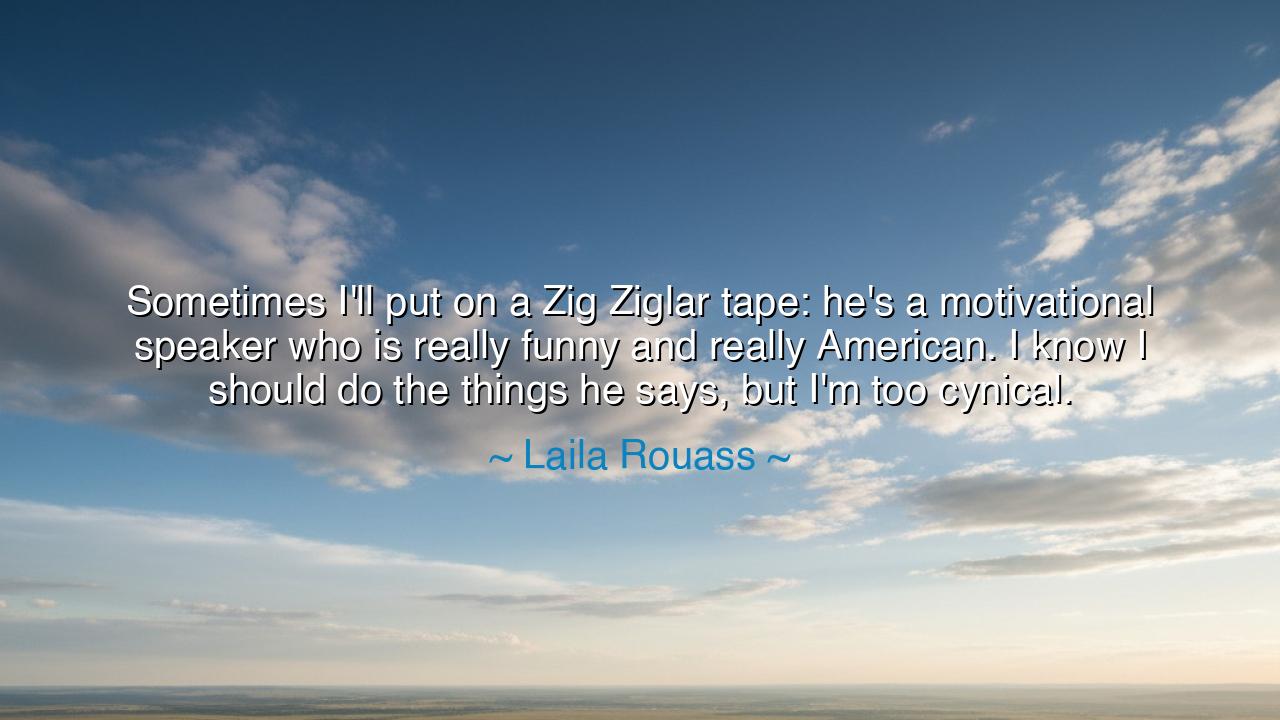
Sometimes I'll put on a Zig Ziglar tape: he's a motivational
Sometimes I'll put on a Zig Ziglar tape: he's a motivational speaker who is really funny and really American. I know I should do the things he says, but I'm too cynical.






In the words of Laila Rouass, we find a confession that is at once humble and universal: “Sometimes I'll put on a Zig Ziglar tape: he's a motivational speaker who is really funny and really American. I know I should do the things he says, but I'm too cynical.” This statement carries the weight of our human struggle with wisdom. It is not merely about Zig Ziglar, nor solely about cynicism, but about the ancient tension between knowledge and action, between hearing the call of truth and resisting it because our hearts are heavy with doubt. The ancients would tell us that to know the way and yet not walk it is a greater burden than ignorance, for the soul suffers when it sees the path and refuses to tread it.
Consider, my friends, the figure of Zig Ziglar himself, a man who spoke with fire and humor, lifting weary spirits in a land that worships motion and achievement. His voice, bright as a trumpet, urged people to rise, to sell, to believe, to endure. And yet here stands Rouass, admitting that even while the words stir her spirit, her cynicism holds her chained. This is no simple weakness; it is the cry of a heart that yearns for hope but fears disappointment. In her honesty, she speaks for millions who listen to the words of sages but cannot bring themselves to act, lest their hope betray them once again.
Think of the tale of Diogenes the Cynic, the ancient philosopher who walked with a lantern at midday, claiming to search for an honest man. His cynicism shielded him from the illusions of society, but it also kept him alone, guarded, and forever doubtful of joy. Likewise, when Rouass admits her doubt, we see both the wisdom of skepticism and the danger of it. For though it may protect us from false teachers and shallow promises, it may also keep us from tasting the fruits of change. Cynicism is a cloak: it shields us from hurt, but it also blocks the sun.
Yet let us not forget that even the cynical can be moved. Recall the story of Marcus Aurelius, emperor and philosopher. Surrounded by corruption, betrayal, and endless wars, he might have grown cold and bitter. But instead he trained himself, daily, to remember that virtue is possible, that the inner self can remain pure despite the world’s filth. He did not deny the ugliness of life, but he refused to let it blind him to truth. And so, he acted with discipline, living out the wisdom he studied. His life teaches us that knowledge without practice is like fire kept in a jar: it gives no warmth, no light.
The meaning of Rouass’s words, then, lies in this struggle: the gap between belief and action. Many of us will nod when wisdom is spoken, laugh when motivation is offered, and even feel the stirring of possibility. But when the time comes to live differently, the weight of our cynicism drags us down. We say, “Yes, that is true,” but in secret we whisper, “It will not work for me.” And thus we remain where we are, neither broken nor healed, alive but unawakened.
But here is the great lesson: to acknowledge our cynicism is the first step to overcoming it. Just as a warrior admits his fear before charging into battle, so too must we confess our doubts before we can rise above them. For wisdom is not meant to be admired like a jewel locked in a box; it is meant to be wielded like a sword, tested, tried, and lived. A teaching does not prove itself by sounding good—it proves itself when, through it, a life is transformed.
Therefore, let the reader take this counsel: when you hear the voice of truth—whether through a book, a teacher, or even the jesting words of a motivational speaker—do not let your cynicism paralyze you. Instead, test the teaching with small steps. If Ziglar says to practice gratitude, begin with one word of thanks each morning. If he urges persistence, take one action today toward your long-delayed dream. Like the planting of a single seed, small acts silence the cynic, for results speak louder than doubt.
Thus, beloved, the quote is not merely a confession of weakness, but a mirror for all of us. It tells us: yes, we are often too cynical to believe, but still, the words of truth echo in our ears, waiting for us to act. The choice is ours—to remain guarded in the shadows of doubt, or to risk faith in action, stepping into the light. And remember: it is better to stumble upon the path of wisdom than to sit proudly in the comfort of disbelief. For even a faltering step brings us closer to the life we were meant to live.






AAdministratorAdministrator
Welcome, honored guests. Please leave a comment, we will respond soon